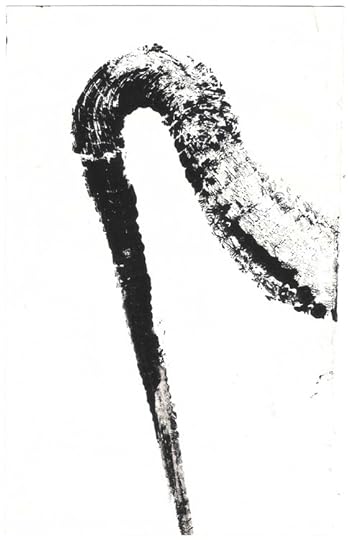C.J. Martin's Blog, page 46
December 27, 2013
George Stanley to Joanne Kyger, 4/19/60.

George Stanley to Joanne Kyger, 4/19/60.
December 18, 2013
Lachrymatory: Or On Finishing My Exams (Kurt Newman)
In response to the question of whether you’re a historian, I can’t think of a more appropriate answer. I miss Kurt.
December 11, 2013
When we relocate to CO in May, this beast will be with us…...
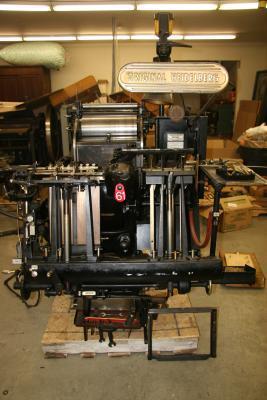
When we relocate to CO in May, this beast will be with us… It’s on!
December 5, 2013
On sale here.
November 23, 2013
gestaltdandle:
Barthelme Only Likes Visual Poetry
November 20, 2013
The Ordinary Weather (Part V)

I’ll be periodically posting pieces of the following, of which this is the last. If you haven’t picked up a copy of David Brazil’s The Ordinary, it’s available here.
- - -
11/10-11/19
Dear DB—
Whether one has soul or no (reading soul in the sense of ‘man that cat’s got soul’—or maybe reading the former as breadcrumb if I’m on the latter’s case), the junk washes up regardless.
Something’s got the best of me & I guess I’m trailing—even before signing—off. But let me leave some junk w/you first:
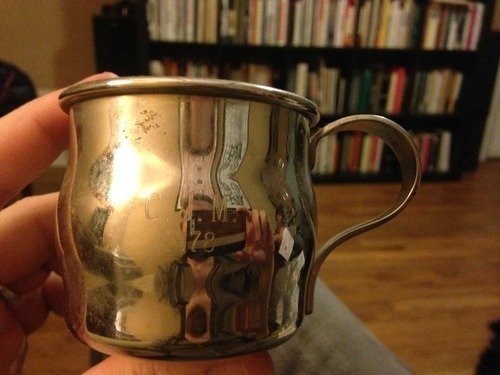
It’s not quite a silver spoon… Maybe there’s a junk joke in this one—it was a gift from my uncle to my dad, on my getting born, who were already estranged and just got even more distant: I only met him once as a kid & not again until all these years later, at the hospital after my dad’s death. He’s the older brother, always had much more money-junk (flew his own plane to the funeral, etc.). They didn’t get along much. Put his hand on my shoulder at the hospital & said, “I’m sorry about your old man, kid.” Seemed broken, kind even. Awkward. Full of regret.
So now I inherit the junk joke & some other junk:

My brother found this key at the debris site, picked it up & handed it over at the hospital. I carried it in my pocket for about a month afterwards. One of hundreds of keys my dad never threw away. Would have opened a trailer at a rig site, I think. Dad was a rough-neck, sometimes a driller (so never quite management, always busting his hump), so this would be the key to a sleeper or something, a break room.
As soon as I had it in hand I pocketed it & thought of Genet’s matchbox coffin in Funeral Rites:

& after a summer of sifting, sorting, trashing (repeat, repeat—& more to come), I reread your poems in light of all this junk & think about value—about the kinds of value I’m unwilling to discard—& I keep reaching for this: these little acts of salvage as touch, as what value’s to be had or held in that daily sift, funereal or not—
Signing off, w/a little kairos in my pocket…
Your friend,
CJ
- - -
Read Part I of this piece here.
Read Part II of this piece here.
Read Part III of this piece here.
November 18, 2013
First mock-up for new edition job: will be a sewn-boards...
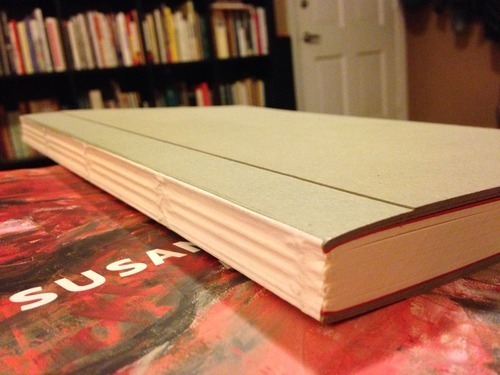
First mock-up for new edition job: will be a sewn-boards binding. Pinched the spine a little on this one—still getting used to the hefty signatures. Will get red cloth covers. More to come in the new year!
November 10, 2013
Some new pieces from a longer new thing…


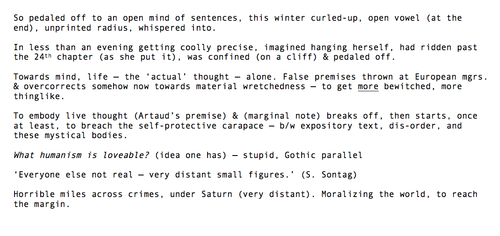


Some new pieces from a longer new thing…
November 4, 2013
Interview with Paul Klinger
Rob Mclennan’s 12 or 20 (second series) questions with Paul Klinger
Paul Klinger grew up around alligators in RWJ Airpark, just outside of Baytown, Texas. He received his MFA from the University of Arizona and his JD from the University of Houston. He has published several chapbooks as a member of the Dusie Poetry Kollectiv. At present, Klinger works as an attorney practicing maritime law in Houston, Texas. He enjoys assisting his wife, Dawn Pendergast, with production of hand-sewn chapbooks for the LRL Textile Series. He is the author of RUBBLE PAPER, PAPER RUBBLE (Further Other Book Works, 2013).
1 - How did your first book change your life? How does your most recent work compare to your previous? How does it feel different?
“Rubble Paper, Paper Rubble” is the first time I imagined a book that would allow me to roam in my activities. I am beginning to understand how the activity that makes a book relates to its size.
This book took me out into the world while I was writing. The writing took place in front of historical markers as I was rubbing and creating the pages that eventually became the book. People would stop and ask me what I was doing. I remember an 8 year old boy walking home from school in Bellaire stopped to watch me and said “Why are you doing that?” I looked down at him and kind of shrugged and then he said, “because you’re bored?”
That kind of interaction hadn’t been possible before. So what this book showed me is how building a project that takes you out into the world can become much more of an immersive experience that folds together interests beyond writing. For this book, the activities that came together were mapping, printing, driving, drawing, and photography. An offshoot from the original activity was documenting the condition of various markers. Trying to figure out why certain markers had bullet holes in them. It became predictable as I was driving out to different areas, seeing locations and even certain subject matter on the markers seemed to trigger that kind of response.
As for how this book compares with earlier work, on the surface, it looks different, but my past work with collage is related. There is a visual emphasis that has held over the past ten years. I think the appropriations have changed in scope. To me, the size of what I take seems larger now than five years ago.
2 - How did you come to poetry first, as opposed to, say, fiction or non-fiction?
Memorization of text was something I enjoyed when I was a kid. In church, I was taught how to memorize large chunks and my interest in poems sprang from memorizing them. I remember memorizing “Ozymandias” in 6th grade and wanting to keep doing that same thing over and over.
3 - How long does it take to start any particular writing project? Does your writing initially come quickly, or is it a slow process? Do first drafts appear looking close to their final shape, or does your work come out of copious notes?
Initially it will take a while to build momentum into a project, but once I feel my way around, I think it picks up quickly and large parts are finished within a matter of days. For “Rubble Paper,” the entire project took about 13 months, mostly because the travel to make the book had to be spaced out because of schedule constraints. I would say that the arrangement of the pieces for this book went through 8 to 10 drafts, but the sections themselves were each built within a matter of weeks. I generated about 1100 pages of rubbings for the book and the final revision came in at 200 pages. There were 3 other sections I can remember that were completely scrapped.
4 - Where does a poem usually begin for you? Are you an author of short pieces that end up combining into a larger project, or are you working on a “book” from the very beginning?
Most of what I do feels longer now. The pieces can be small but they are seldom free-standing. I think I tend to abandon work that has a short feel in favor of anything that promises to turn into a marathon.
5 - Are public readings part of or counter to your creative process? Are you the sort of writer who enjoys doing readings?
I enjoy readings. I haven’t done many of them, but when I have, I’ve had the privilege of reading with great poets. I think the pressure of reading with someone is useful in that you feel compelled to attend their work in a different way than when you are reading it. That’s the creative part of a reading to me. The pressurized listening.
6 - Do you have any theoretical concerns behind your writing? What kinds of questions are you trying to answer with your work? What do you even think the current questions are?
Mostly, I worry about what writing looks like and the idea that there is AN appearance as opposed to a spectrum of them.
7 – What do you see the current role of the writer being in larger culture? Does s/he even have one? What do you think the role of the writer should be?
My own imperative is to place myself in something that is not designated as a writer’s life. That doesn’t work for me. Writing works for me as what I do while something else is going on. I need my role as a writer to be offstage/off-center.
8 - Do you find the process of working with an outside editor difficult or essential (or both)?
Essential. The editor of this book, C.J. Martin, had a vision for the book that exceeded mine. I had a very flat form in mind. He gave it dimension. We had two different forms and he saw how to situate them. I look back at my first reaction and I see how little I understand book form. I’m thankful that C.J. has this singular reverence for books that makes him so sensitive to materials and the physical presence of the book.
9 - What is the best piece of advice you’ve heard (not necessarily given to you directly)?
“Be together.” — Barbara Henning
10 - What kind of writing routine do you tend to keep, or do you even have one? How does a typical day (for you) begin?
I don’t have a routine unless I’m traveling. When I take trips, I try to make sure I have multiple pocket books to write in.
11 - When your writing gets stalled, where do you turn or return for (for lack of a better word) inspiration?
I go on a trip for a week or so by myself, usually in late summer or in December. I also tend to go digging. There are some woods that I go to that have trash from the 30s and 40s left by hunters and fishermen in and around some old cabins.
12 - What fragrance reminds you of home?
Duckweed.
13 - David W. McFadden once said that books come from books, but are there any other forms that influence your work, whether nature, music, science or visual art?
Max Ernst has been on my mind for the last two years. His frottage has a lot to do with the book I’ve just made.
Terrence Malick’s films, particularly Days of Heaven, The Thin Red Line, and Tree of Life have been influences.
14 - What other writers or writings are important for your work, or simply your life outside of your work?
Susan Howe. Robert Duncan. Gertrude Stein. William Bartram. Richard Brautigan. Flann O’Brien. Tenney Nathanson.
15 - What would you like to do that you haven’t yet done?
I would like to participate in the filmmaking process.
16 - If you could pick any other occupation to attempt, what would it be? Or, alternately, what do you think you would have ended up doing had you not been a writer?
I would love to be a casting director and feel pretty confident I would be good at it. I think about actors too much. I should be getting paid for it.
17 - What made you write, as opposed to doing something else?
I had two teachers in high school who made sure I would do nothing else: Janey Chambless and Susan Adcox.
18 - What was the last great book you read? What was the last great film?
The last great book I read was Kevin Varrone’s g-point almanac: passyunk lost. The last great film: The Place Beyond the Pines.
19 - What are you currently working on?
I have a lot of photographs taken over the last ten years that I’m trying to organize into a book.
October 29, 2013
furtherotherbookworks:
Brenda Iijima & C.J. Martin | 2013 |...

Brenda Iijima & C.J. Martin | 2013 | 18” x 17” Giclée Print | Signed
The third in a series of broadsides engaging visual art by poets. For this collaboration, I sent Brenda Iijima a poem and she responded with not just a collage, but an entire broadside design, complete with wood paneled background! (In the original, it’s real wood cut thin enough to be mounted with glue.) My poem is from a short sequence called “Nuclear Envoi,” written in early 2013, and it picks up on (among other things) lines from Helen Adam’s childhood reader—as does Brenda’s collage, which contains scans of pages from that book.
Printed in an edition of 25 copies.
C.J. Martin's Blog
- C.J. Martin's profile
- 11 followers




